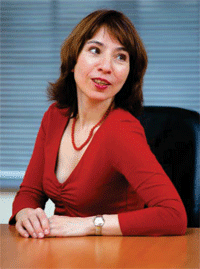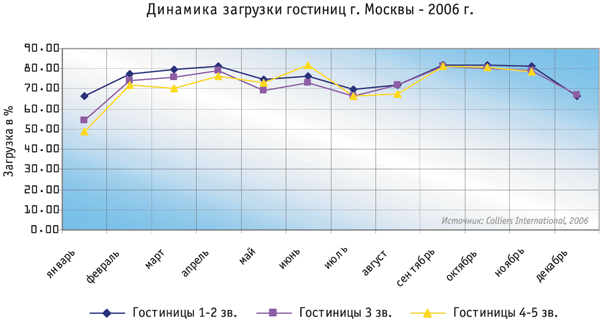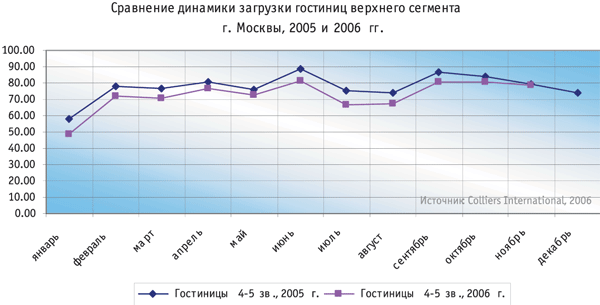
Marina Smirnova is the Deputy Director of the Consulting Department, Head of the Hotel Consulting Group at Colliers International.
About the company:
Colliers International is an international consulting company providing services in the field of commercial real estate. It unites offices in North and South America, Europe and Asia, which makes it possible to apply international technologies taking into account the specifics of local markets, as well as to carry out the most complex real estate transactions in any country in the world. Today, the company offers a full range of services in the field of commercial real estate and takes into account all possible client requirements.
Cooperates with both international corporations and Russian companies.
Provides consulting services on the lease and sale of office, retail and warehouse premises, consults in the field of hotel real estate. Also provides services in real estate valuation, market research, concept development, real estate management, conducts analysis of investment projects and much more.

Irina Ushakova– Senior Analyst at Jones Lang LaSalle Hotels Russia & CIS
About the company:
Jones Lang LaSalle is the only real estate company included in the Forbes 100 Best Companies to Work For list and the Forbes 400 Best Large Companies list. It has over 150 representative offices operating in more than 450 cities in 50 countries. Total turnover in 2006 was approximately US$2 billion. The company provides comprehensive real estate and capital management services to owners, tenants and investors at the local, regional and global levels. It is a market leader in corporate real estate management services – the company’s portfolio comprises more than 92.9 million square meters of space worldwide. In 2006, the total volume of concluded transactions for acquisition, sale and attraction of financing amounted to US$70.9 billion.
AZ:For several years now, Moscow has been experiencing an acute shortage of hotel rooms (especially in the mid-price range). What are the prospects for the construction of new hotel facilities in the capital?
Marina Smirnova:There is no shortage of hotel construction plans in Moscow: according to the Moscow Government, 100 hotels are to be built in the next three years, or one every three months. Of course, these plans will be adjusted by the realities of life, but already in 2007 it is planned to open (in addition to the Ritz-Carlton, which received its first visitors in July 2007), the Milan Hotel (300 rooms, Shipilovskaya Street) and the Borodino Hotel (230 rooms, Rusakovskaya Street). Both hotels are positioned in the middle segment (3-4*) in terms of service, but in terms of price – rather in the upper segment (the cost of staying in a standard room will be 200-250 US dollars per day).
According to the forecasts of our company's specialists, Moscow will see the construction of mainly expensive hotels, which is explained by the high cost of land and high competition for its plots between other commercial and residential real estate projects. Relatively cheap hotels will be «squeezed out» closer to the Moscow Ring Road, to areas with difficult transport accessibility and undeveloped (from a business point of view) areas.
Irina Ushakova: There is indeed a deficit, and not only in the most popular mid-market segment, but also in the high segment. Unfortunately, mid-market hotels are not often appearing in Moscow yet.
About three hotels have been put into operation in recent years, but all of them are in the high segment. The hotel «ORCO MaMaison» (Pokrovka Street) is expected to enter the market, but all of these are isolated cases.
The Moscow Government's plans to build more than 350 hotels by 2010 have been changing for several years, but not many new hotels have appeared. First of all, our company is considering the market segment in which there are facilities comparable to the international level. Not many hotels are being built here: the Four Seasons (in the renovated Moskva Hotel), the Hilton (on the site of the Leningradskaya Hotel) and the Moscow-City complex of buildings, where hotel facilities will also be located, are expected to open.
Our forecasts regarding plans to build 350 hotels by 2010 are too ambitious. The market will mainly expand due to the replenishment of the high segment.
Properties in the middle segment will also definitely be in demand in the capital in the next two years and their prices will remain just as high.


AZ»: Moscow hotels stand out from other major cities in the world due to their very high prices. How do you think this situation affects hotel occupancy rates? What is your forecast for further price increases?
Marina Smirnova:We are enclosing our annual report on the Moscow hotel market. It shows the dynamics of prices and occupancy.
Of course, high prices affect the decrease in demand, but in general, since the purpose of the trip of the main clients of the city's hotels is business, there is no substitute for this direction (a client with business connections in Moscow cannot conduct negotiations in any other city). Therefore, during the week, demand remains high, and on weekends and holidays it decreases.
The absence of «weekend tourists» and other client groups capable of compensating for the decrease in occupancy on weekends and in the summer months leads to a decrease in the average annual occupancy rate, while, I repeat, during the business week demand remains at 100%.
Irina Ushakova: This is reflected in the fact that over the past two years, hotels have been raising their prices by an average of 35-40% per year. Prices have been rising steadily over the past few years, but in 2006 the market's reaction to hotel occupancy was felt: hotel occupancy rates began to decline slightly.
However, the latest trend shows that occupancy has increased again, and prices are again heading up.
Today, Moscow is the most expensive city in the world.
One proof of this is the insane prices for hotel rooms. Even if it is a 3* hotel worldwide, in Moscow the hotel can position itself as a 4*.
«AZ»:How active are investment and construction companies in the hotel construction market in Moscow? What are the main problems for investors, and what are the solutions?
Marina Smirnova: The problems are plots and obtaining permits.
Money is not a problem.
Irina Ushakova:First of all, the investor should ask himself the question — is it worth it to build a hotel at all? Now preference is often given to other market segments — it is more profitable to build offices, retail space and residential real estate. If there are any encumbrances or the developer has deliberately decided to build a hotel, then the 5* segment, being very expensive, will pay off for a long time.
Construction of a 3* hotel will also be expensive due to the high cost of land, investment in obtaining permits, attracting additional capacity, and will not pay off quickly.
Today, it is most profitable to build a 4-5* hotel, which is aimed at business clients, which allows for higher rates. It is difficult to talk about specific payback periods, since there are many project factors that need to be taken into account. But, if we generalize, we can talk about a payback period of 8 years or more. And the main difficulty for a developer today, however, as for other segments of the real estate market, is the purchase of a vacant plot of land.
«AZ»: There are many cases of demolition of outdated hotel buildings in the center of Moscow. Is the city keeping up with the pace of construction of new hotels so as not to further complicate the situation with the shortage of hotel rooms?
Marina Smirnova: Not yet.
The deficit associated with the closure of the Ukraine Hotel (1,017 rooms) for reconstruction and the demolition of the Rossiya Hotel (3,500 rooms) is about 3,000 rooms. In 2006-2007, the following were opened: Holiday Inn (312 rooms, Sushchevsky Val), Peter I (134 rooms), Holiday Inn (524 rooms, in Sokolniki), Ritz-Carlton (332 rooms), Borodino (230 rooms). A total of 1,532 rooms.
Irina Ushakova: The city really does not have time to compensate for the deficit of rooms.
After the demolition of the Rossiya Hotel and the dismantling of the Moskva Hotel, customers who are not willing to pay $600-700 per night are forced to stay in hotels left over from the Soviet era, of which there are not many and the quality of the services they provide leaves much to be desired. And, as I mentioned earlier, to compensate for the lack of rooms, it is necessary to build mid-range hotels.
AZ:In the last two years, large international hotel chains have been actively entering the Moscow market: Ritz Carlton has taken the place of the Intourist Hotel, Four Seasons has taken the place of the Moscow Hotel, and Hyatt will be located in the Federation Tower. How will the arrival of luxury hotel chains affect the city's investment climate?
Marina Smirnova:The entry of international high-class operators into the city's hotel market emphasizes its investment attractiveness, especially for Western banks and funds. But this is a consequence of the improvement of the investment climate in Moscow, and not the other way around.
Irina Ushakova: The Russian market is of interest to brands such as:
”InterContinental”, ”SHANGRI-LA”, ”Peninsula”, ”Mandarin Oriental”. These are mainly operators that do not yet have a representative office here.
Only near Red Square, four different hotels are planned inside the building of the ”Russia” hotel, divided into different zones. A hotel will be built on Ilyinka Street, on Tverskaya Street and all the facilities will be 5*.
AZ:What prospects are opening up for engineering companies working in the field of building automation and air conditioning systems in connection with the Moscow Government’s plans to build hotels in the capital?
Marina Smirnova:As the number of hotels increases, competition between them increases. In this regard, the influence of such factors as: cost control, hotel revenue management, automation of all profit centers increases. As for climate control and air conditioning systems, the presence of such systems is a mandatory requirement for modern 4* hotels and above, and international operators require the installation of such systems in lower-class hotels as well.
Irina Ushakova:Each chain of Western hotels has its own internal standards, regulating, among other things, the arrangement of engineering equipment. I believe that engineering firms should first of all focus on specific hotels from well-known brands, where the possibilities for selling their products and solutions are predictable. Now the boundaries between the star ratings of hotels have become mixed, and there are no uniform categories for hotels. For example, the Accor, Rezidor SAS or InterContinental chains have their own standards.
AZ»: Which of the hotels currently under construction (or recently built), whose projects are interesting from the point of view of architectural planning solutions or engineering approaches, would you highlight?
Marina Smirnova:From an architectural point of view, the projects in Moscow City (for example, the Russia Tower), on Golden Island (architects: Van Egeraat and Nunez) promise to be interesting. Obviously, there will also be original engineering solutions. But the implementation dates for these projects have not yet been determined. Other hotels under construction, in my opinion, do not offer anything very original (Moscow assumes the reconstruction of the previous hotel). The filling of the hotel is of the luxury class. Perhaps some innovations in communications, control systems, but this depends on the operator's requirements.
Irina Ushakova: Considering that in general not many new hotels have been opened in Moscow over the past two years, it can be noted that the room stock is outdated, and modern technologies are not often used. I would like to note the Ritz Carlton hotel, its developer was Capital Partners.
AZ:Sochi has won the right to host the 2014 Winter Olympics. What is your forecast for the development of hotel construction in this region?
Marina Smirnova: The city administration has forecast to build 26,000 new hotel rooms. It is obvious that it will be apartments (housing) rather than hotels.
It is planned to build 1 million square meters of space in Imeretinskaya Bay, primarily hotels, housing, and infrastructure.
Irina Ushakova: Investments in Sochi must take place. The city's infrastructure will change, including the construction of new hotels. Considering that the region itself is «seasonal», it is necessary to focus on conference facilities when building hotels.
A kind of analogy can be drawn with the French city of Cannes, since the ideology of both cities has many similar features. Russian oligarchs and financial structures have bought up many plots of land in Sochi and, most likely, they will be the ones selling plots for construction or engaging in development themselves, including hotels.

Добавить комментарий